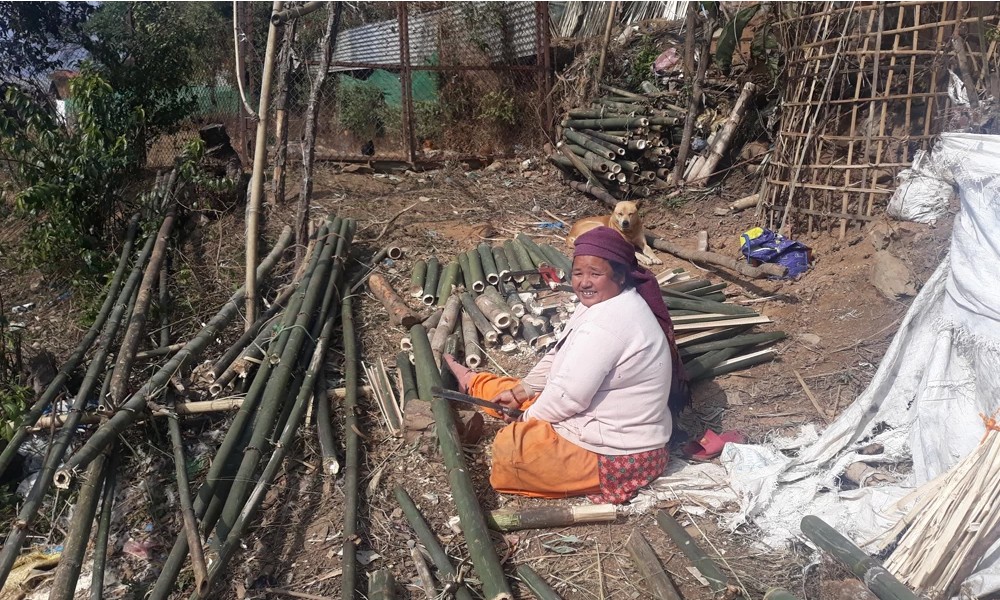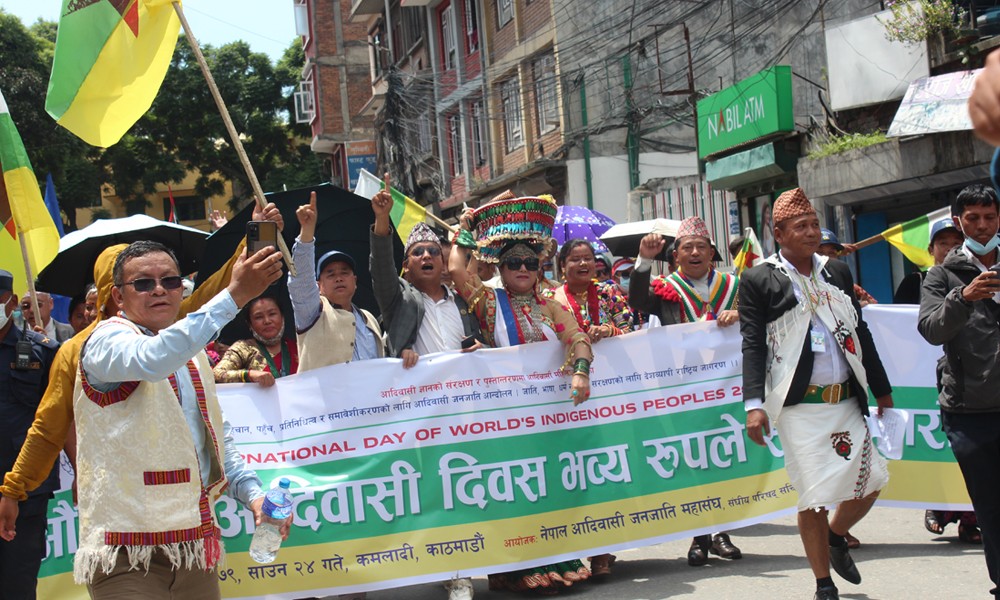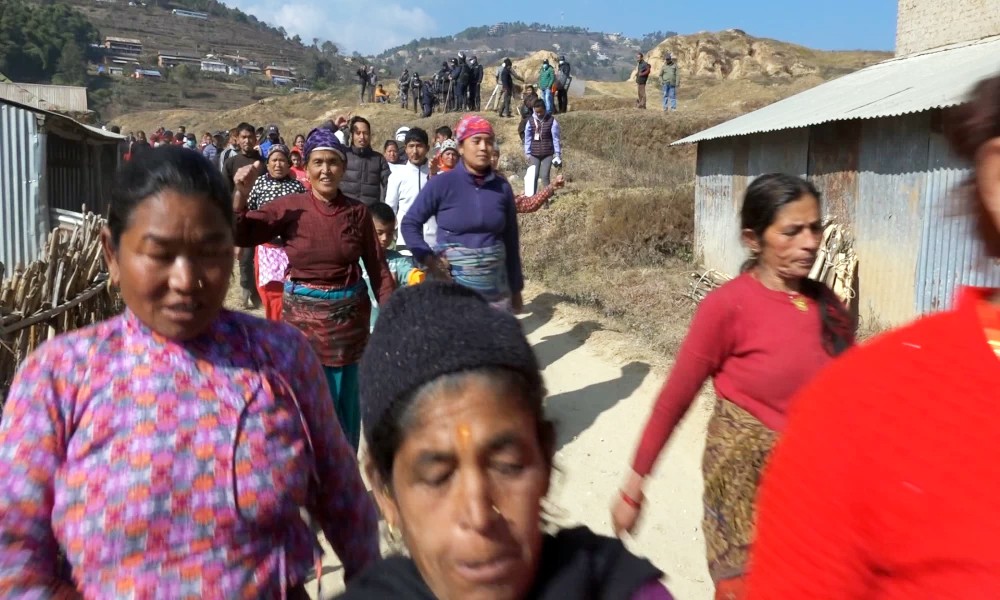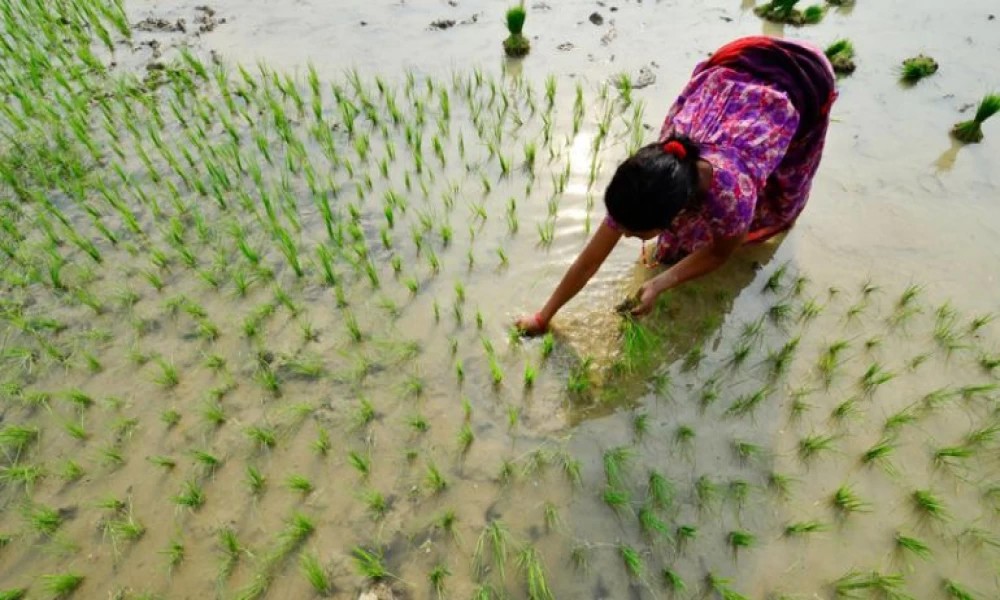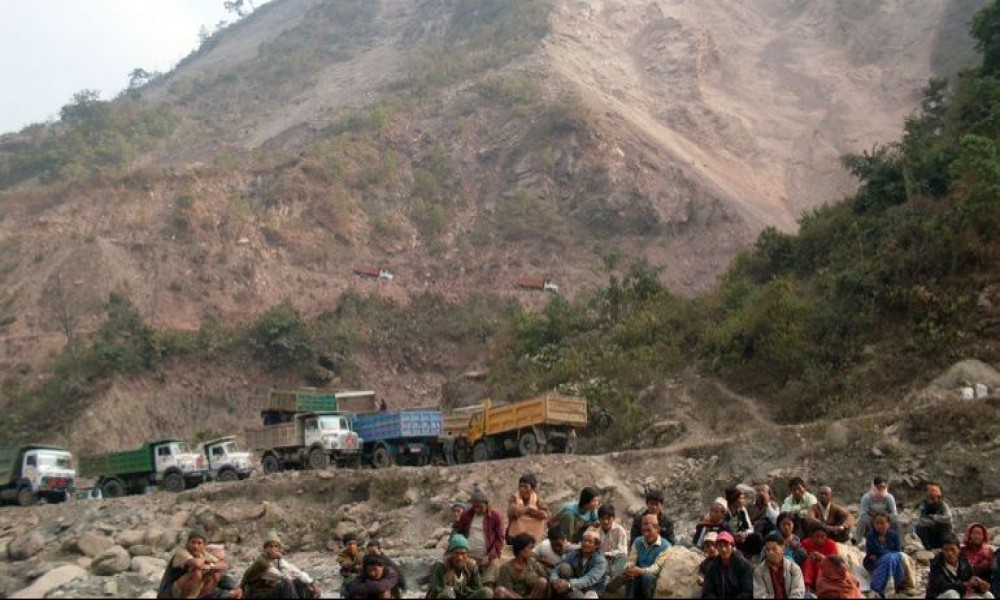Traditional skills are practiced only in origin place
Most households in Pahari village of Badikhel, Godawari-4 have various bamboo and cane goods for sale. Not only are these items for sale, but we can find most locals busy making them as well. All these bamboo and cane goods are not brought from outside but are produced locally. Moreover, all of these goods are handcrafted by the local indigenous Pahari community using their traditional skills. Pahari women here are actively involved in the making of these items, their marketing, and preservation of their traditional skills. Locals say that since there is a lack of support and incentive from the state to preserve such skills, the production of such goods is now just for the sake of continuing their traditional practices.
Pahari community is among the 59 indigenous nationalities enlisted by the National Foundation For Development of Indigenous Nationalities. According to the 2011 census, Pahari community are found in about 43 districts of the country. They have an estimated population of 13,000 among which around 5,000 are living within Godawari municipality of Kathmandu valley.
Outside the valley, Sindhuli, Ramechhap and Gorkha districts also hold significant Pahari population. Even though Pahari people have settled outside the valley, their traditional skill of bamboo weaving is practiced only in Badikhel. Northern Badikhel has a dense Pahari settlement. Their main livelihood sources are making and selling such bamboo items, making liquor and farming. According to Mukunda Pahari, chairperson of Nepal Pahari Development Association, the continuance of such skill in Badikhel is an example of the theoretical concept that the traditional skills of indigenous people can proliferate only in their origin places and native lands.
According to experts, such traditional skills have contributed to rural economy and addresses the issue of unemployment to some extent. According to activists working in this sector, these skills also contribute in minimizing the effects of climate change and supports environmental protection.
Definition of Traditional Skill
In simple words, traditional skill is a generational skill. Such skills which are automatically handed over from one generation to the next, its practice is based on local needs and geography. According to indigenous experts, such skills abound in such lands, places and areas where indigenous rituals are alive and practiced rigorously. These skills are preserved from generation to generation mainly due to spiritual belief, cultural heritage, rituals and prevalent knowledge. According to indigenous expert Dr. Kunsang Lama, indigenous skills are born out of livelihood needs and the peripheral natural resources available. Even though these skills may seem to be tied to subsistence livelihood, on deeper inspection we can see that it is deeply connected with the land, forest and water.
Just like Dr. Lama's statement, this traditional skill of indigenous Pahari people are also tied to the forest, and natural resources of their area. They also have other traditional skill which are transferred from one generation to the next within their family circle. The indigenous people are sustaining their livelihood through traditional skill and knowledge. The previous generation are transferring their skills and knowledge to the new generation.
Skill based in Indigenous knowledge
Indigenous communities have their own skills and knowledge. Making goods from bamboo from centuries ago, clothes made out of sheep's wool, materials created from wild nettle fabrics, making of traditional medicine from wild herbs are some examples of indigenous knowledge. Indigenous women have been weaving clothes, carpets and fabrics to fulfill their personal and household needs. Such skill are also transferred generationally. According to Tunga Bhadra Sampang Rai, a climate change expert, such generational skill of indigenous women are also based on their culture, land, water and forest resources. A generation prior to this current young generation still had retained such traditional skills. But now, this current generation has less interest in learning such skills. Shanti Dewan, secretary of National Indigenous Women's Federation, also thinks that current young generation do not show much interest in such traditional skills and knowledge. In her own words, "I feel sad to think that such precious skills may soon get lost. It is not possible to preserve them through small programs and efforts of one or two individual or organization. It is possible only if the state changes its laws and policies accordingly and make effort to bring changes from the lowest level."
Indigenous skills are being lost with modernity. Indigenous experts say that in such a situation, the government should bring changes to their laws and policies to preserve these skills.
According to Raghubir Bista, young economist and Assistant Professor of Tribhuvan University, such traditional skills and knowledge are associated with Nepal's history and civilization. Specially during Malla era, traditional skills were categorized according to caste. Dr. Bista thinks that indigenous people of the hills have mostly been able to preserve their traditional skills.
Indigenous skills are being lost with modernity. Indigenous experts say that in such a situation, the government should bring changes to their laws and policies to preserve these skills.
The isolation technique adopted during the COVID pandemic is similar to the isolation practice of indigenous Gurungs and Newars. According to sociologist Dr. Ganesh Gurung, in the past everybody had to stay in isolation before entering their homes when they returned from Tibet. He said that all indigenous people have their own traditional skills and knowledge, such as sheep farming in Gurung community or yak farming in mountainous regions. He said that even making of hard cheese (chhurpi) falls under indigenous skill. Production of bamboo items by Pahari is a similar indigenous skill.
Practicing the traditional skills of Pahari Women
The traditional skills of Pahari women are multidimensional in nature. Pahari community have other skills besides making of bamboo and cane items which is tied strongly with the identity and recognition of Pahari community. We can list the traditional skills of Pahari women as follows:
- Making bamboo and cane items
Pahari women are independently capable of working with bamboo and cane, and are not just assistants to men. They can separate bamboo fiber and can create baskets like doko, dalo, or nanglo from it. They are continuing this skill in Godawari where there is a dense Pahari settlement. Making of bamboo items is their traditional skill and knowledge.
The women work equally as men in bamboo craft. Niru Pahari says that she has been making bamboo winnowing basket (nanglo) for 40 years now. She tells us that her parents taught this to her when she was a child, and she became an expert as she continued doing it. She says that there are many other women like her in the village who work with bamboo. We met Niru during the month of Magh-Falgun when it was time to store bamboo. We found Niru and her husband busy harvesting bamboo and chopping them into pieces for storage. During these months, the people cut bamboo from the forest, chop them into different desirable shapes/sizes and place it in their rooftop for drying. We can see bamboos being dried in every village of Badikhel during this season.
Pahari women are independently capable of working with bamboo and cane, and are not just assistants to men. They can separate bamboo fiber and can create baskets like doko, dalo, or nanglo from it. They are continuing this skill in Godawari where there is a dense Pahari settlement. Making of bamboo items is their traditional skill and knowledge.
Similarly, Sarita Pahari who also works with bamboo told us that she has been doing this for 18 years. She no longer makes the winnowing basket. Instead she now makes bamboo badges, clock frames, photo frames, and vases according to her client's orders. She has taught this skill to her children as well. It is the traditional work of Pahari women to make different items from bamboo. Many of them earn their livelihood by creating different types of basket and other items from bamboo. Mangali Pahari is another example who is busy making bamboo basket all day long utilizing her traditional skill. She learned bamboo work when she came to this village after marriage. She has not needed to do daily wage labor work since she learned how to weave bamboo baskets. She says that it has been easier for her to take care of her household and educate her children since having this skill. It was very difficult for her to learn it at the beginning but now she finds it easy.
All of them said that even though they skillfully produce these items, there is no market for these goods. They take a lot of time and effort to make, but the value of their product is very low.
It is their traditional skill to make items out of bamboo and cane.
Laxmi Pahari who we found making winnowing basket (nanglo) says that she has been working with bamboo for 16 years now. Both the husband and wife do this work. Laxmi was making nanglo with 5-6 other women when we met her. She says, "I am managing my household and children's education expenses through bamboo work so far. But the value of our product is very less in the market compared to the effort we put in." She makes about 2 to 3 nanglo a day. They travel all the way to Lagankhel, Chabel and as far as Kirtipur to sell their products.
- Skill of making homemade liquor
Besides making of bamboo items for livelihood, Pahari women also have skills like farming, livestock rearing and making liquor. Although Nepal government has not legalized making of liquor at home, for most indigenous women this is a very important source of income. They express their concern that since it's illegal and the selling of such liquor is banned, it is hard for them to openly pursue this occupation.
Shanti Dewan, secretary of National Indigenous Women's Federation expresses her dissatisfaction with government's law that prohibits the indigenous traditional practice of making alcohol. She says that Nepal government has made making of yeast (marcha) illegal. Due to government's reluctance to accept the indigenous skill and knowledge that exist within the country, now foreigners are taking advantage of it by branding the same yeast and selling it in Nepali market.
Indigenous women learn making of such homemade liquors from their mothers which is based on the culture of each community. But since production of liquor for commercial purpose is prohibited, Pahari women say that now they have abandoned this practice.
- skills to make Pahari cuisine
Another skill of Pahari women is to make different cuisines required for their various cultural festivals. Some people practice making these cuisine for commercial purpose as well but there is no market for these in the village itself. According to Bina Pahari, chairperson of Pahari Women Development Society, the main cuisine of Pahari people are finger millet whey, different items of buckwheat, dry fermented spinach (gundruk) and nettle soups.
Such account of Pahari cuisine is also found in the book written by Pahari leader Shankarman Pahari. Pahari women are the ones who primarily do the kitchen work. Food during feasts are made from beans like black soybean, green beans, and horse gram and have generous use of ginger and garlic. Shankar Pahari says that the feasts of Pahari are similar to those of the Newar community. In most feasts, beaten rice, buffalo meat, soybean, bean, ginger, garlic and rice flour breads are common.
The cuisines of Pahari people are found to be different in different places. Due to the influence of different communities, their food are found to change according to the communities who reside around them. Paharis of Sindhupalchok, Sindhuli pursue fishing for their livelihood. And their food also reflect this.
According to Bina Pahari, chairperson of Pahari Women Development Society, Pahari communities are found to be influenced heavily by their neighboring communities. According to her, the Pahari people of Sindhupalchok, Kabhre, Ramechhap, Sindhuli are heavily influenced by Tamang community while the Paharis of Lalitpur are found to be influenced by the Newars of Kathmandu. In East, they are influenced by Rai while in the West we can see them being influenced by Khas Arya communities.
Market situation
The Pahari women take their goods to different market areas of Kathmandu for selling. Some customers who place orders also come themselves to collect the items but most of the time, the women take their bamboo items themselves to different parts of the cities and villages looking for buyers. Local products like theirs do not have a good demand in market due to easily available plastic materials. Now, even goods which were once made only by bamboo like doko, nanglo, dalo are getting aggressively replaced by plastic materials.
Pahari people are slowly forgetting their culture, ritual, language, skills and knowledge. He says that even though there has been a generational transfer of skill so far, the youth of today are not interested in learning them anymore.
There is no well-managed market for goods that are made from bamboo fiber using traditional skills. According to Bina Pahari, there is a huge lack of market for the bamboo products that are created by Pahari women. They have to bring raw materials from another district Kabhre, and when they do not find good value of their products, many are now forced to work as daily laborers.
Pahari elders fear that this traditional Pahari skill may soon be lost even though Pahari women are continuing it till now. Pahari leader Shankarman Pahari expresses his concern that Pahari people are slowly forgetting their culture, ritual, language, skills and knowledge. He says that even though there has been a generational transfer of skill so far, the youth of today are not interested in learning them anymore.
In recent times, like other communities, people from Pahari communities are also choosing foreign employment and other non-traditional work for income generation. Sita Timalsina, a local ward member, says that the local municipality has been giving grants annually for bamboo cutting machine, training, farming etc. so that it is easier for locals to make local products. The ward even gives financial support to buy bamboo, or seeds for farming to low income families. She further says that since there is a need to save the traditional Pahari knowledge, the ward plans to pursue a number of steps in future for its preservation.
Similarly Bina Pahari, chairperson of Pahari Women Development Society, says that their cultural organization has done a number of awareness raising programs in collaboration with local governments and different NGOs to preserve this traditional occupation and teach the skills. She feels that such programs have benefitted the local Pahari women. She tells us that many skilled women are now choosing daily wage laborer jobs because the raw materials are expensive to buy and the market value for their products are not good.
According to ward member Timalsina, even though they cannot manage local market in their wards right away for the bamboo products, they are attempting to create good market in the near future. She informed us that they conduct various programs to promote skill development annually from the ward's budget. Now, they are discussing about creating a storage space for the products and materials.
Economic situation of Pahari women
The tradition of making bamboo and cane items is not found in all Pahari people. Pahari people living in different areas adopt different occupation and skills for their livelihood. The economic situation of Pahari women is not very well. According to Bina, "In the past also, Pahari women were far behind compared to women from other communities. And they are behind compared to people within their community as well." The main income source of women are the traditional skills they learned from their elders and then daily wage labor jobs. According to Bina Pahari, there is no presence of Pahari women in sectors like education, politics, and current affairs. But Pahari women are slowly learning about their rights. In recent times, their presence in different programs have been good.
Most Pahari women use their traditional skill for income generation. They say that it has been easier for them to run households since they have learned these skills and use them to generate income. Sanu Kanchhi Nagarkoti Pahari is one such woman who no longer has to depend on her husband for money. "My husband works with bamboo, and I also do the same. We are taking care of our household and kid's education expenses," she says.
One bamboo nanglo sells for rupees 350 to 600. If one works since the morning, it is possible to make about 3 nanglos a day. Mangali Nagarkoti Pahari also weaves about 2 baskets a day. Such baskets sells for 500 to 800 rupees. Her husband usually takes these baskets to the city for selling. If there are orders, customers come to their homes to pick up the items.
In this way, traditional skills are found to be playing important role in improving the economic situation of Pahari women. But nowadays, there is a lack of bamboo and other raw materials in the villages. Many materials have become hard to find. Now, they have to travel as far as Kabhre to buy bamboo -a single pole of which costs anywhere from rupees 150 to 300.
The new generation of Pahari people are more educated. They are embracing new businesses, and employment opportunities instead of continuing traditional occupations. Pahari women are also more advanced compared to the past generation which we can see from their involvement in foreign employment, adoption of new technology and knowledge. But in case of education, Pahari women are still backwards even though they live within the capital. Slowly, even that situation is changing as more Pahari women are getting education.
Traditional skills and the impact of climate change
Nepal is not free from the adverse effects of climate change which has affected the whole world. We can see the direct impact of climate change in the mountains of Nepal already. Indigenous population are particularly affected by climate change.
Tunga Bhadra Sampang Rai, a climate change expert, says that climate change affects indigenous women in two main ways. The first impact is the disturbance climate change brings about in natural resources. It affects indigenous knowledge in negative way which directly impacts indigenous women. And the second impact is that governments create new rules, laws and programs to minimize its effects which may bring about barriers to the traditional occupations, natural resource and land use rights of indigenous people. In this way, there may be two-fold impact of climate change according to Sampang Rai.
Climate change has caused delayed rainfall, floods and landslides, dry landslides, and other natural calamities which has reduced the natural resources and materials that are essential for indigenous traditional skills.
Another expert Dr. Bista also has opinions similar to Sampang Rai. Climate change has directly or indirectly created negative impact to indigenous skills. Climate change has brought about different problems in Nepal's rural areas. He says, "climate change has caused delayed rainfall, floods and landslides, dry landslides, and other natural calamities which has reduced the natural resources and materials that are essential for indigenous traditional skills." He says that this has directly impacted the lives of people who are still dependent on such traditional skills for their livelihood. We can see the effect of climate change particularly in agriculture, livestock, knowledge, skill and resources. But the government is silent on how these skills also help to minimize the effects of climate change.
The bamboo and cane items made using the traditional Pahari skills are an alternative to plastic materials. Creation to production of plastic materials is responsible for carbon emission. Dr. Bista and Sampang both univocally say, "we can reduce the challenges of climate change if we promote such traditional skills."
Situation of generational transfer of skills
Mangali Pahari, who we found weaving bamboo baskets, thinks that this work will stop with her husband and herself. Because her children do not take much interest in this work, instead they say that they will pursue other businesses and jobs after their education. They say that it is hard to learn this skill, it involves a lot of hardship, and there is no value of the product in the market that is why they feel hesitant to learn this work. Mangali Pahari and her husband has somehow continued this work up to their generation but now the new generation after them are no longer learning the skills.
The young generation do not take any interest in learning traditional skills. All the educated ones have chosen other fields of business, jobs or foreign employment. Mabin Pahari, a recent high school graduate, knows all about this ancestral skill. He has seen his grandparents make bamboo baskets and materials since he was a child. But he has not learned to weave them. He says, "I also want to learn the skills of my elders. I also want to create beautiful pieces and materials. But I don't see any future in this work." He says there's no good return for the amount of trouble, time and hard work one has to put in, therefore he wants to opt for other alternative occupation.
Tara Pahari has been making nanglo for 3 years. She learned this skill from her in-laws when she got married into a household in Badikhel. She also does regular farm work besides bamboo weaving. There are a lot of women in Badikhel who have learned this skill after their marriage. Kamala Pahari, vice-chairperson of Nepal Pahari Development Association, says that she also makes different bamboo items and often takes them around Lagankhel for selling. She says that if one is not shy of working hard, there is also an opportunity to make money. If one has skill at hand, it can be utilized any time. According to her, the state of preservation of their language, custom, culture, religion and skill so far is relatively good in Badikhel.
According to young economist Dr. Raghubir Bista, Pahari people are continuing their occupation of creating bamboo baskets and other items. Earlier, the market of bamboo materials used to be good but now Nepal has adopted open market and globalization. The new generation also wants to pursue jobs that are easy and pays more. Due to these factors, both men and women are slowly abandoning their traditional skill work. Not only bamboo work, they are slowly leaving agriculture as well. It has become a challenge to protect traditional skills. Another indigenous rights activist and secretary of National Indigenous Women's Federation Shanti Dewan shares the above mentioned opinion. The young generation are already used to the new technologies, they have no knowledge about their ancestral occupations and so it has become a challenge for them to understand and learn these skills. Therefore, Dewan is concerned that it might likely be impossible to save traditional knowledge and skills in the coming days.
Is it environment-friendly or not?
Experts say that the materials produced by indigenous communities are environment friendly. According to expert Dr. Bista, these days chemicals are used even for fishing which harms our environment and health. But the traditional way of fishing is to use bamboo baskets which does not harm the eco-system and also does not leave any adverse effect in the lifecycle process.
The traditional indigenous knowledge is connected to protection of environment because even though it uses natural resources, it also has many practices of protecting the nature. Indigenous people know how to preserve the natural resources for future even as they make use of it. Climate change expert Rai says that traditional skills are very much environmental friendly. He says that the traditional skills and knowledges make use of natural resources but it also has important methods of protecting these resources therefore, they do not create any adverse impact on environment but is in fact protecting it. Even though the plastic items found in the markets are cheaper than bamboo items, the bamboo items eventually degrade and decompose. So in the long term, the bamboo goods are much more beneficial. According to Dr. Bista, the market is swamped with plastic and other harmful materials due to the demand of consumer but we do not think about how much harm these cause to the environment. Experts say that therefore there is a need to promote and preserve materials made from traditional skills if we want to save our environment.
Situation of self-employment
In Nepal's overall context, youth are migrating out of the country. The main source of income has now become foreign employment. If the state can promote traditional skills to the global market through creation of employment opportunities, it will most likely help to improve the economy.
There are many skills within the indigenous communities of Nepal but they have not received any protection and promotion. Expert Dr Bista says that it is important for the government to protect these skills and knowledges in order to create employment within the country. Countries like Japan, China have successfully marketed their local and traditional skill to the global market. They are good examples of producing raw materials and teaching the new generation about local skills and knowledge. Dr. Bista who thinks that the role of government is primary in protecting traditional skills says that if we could manage proper grants, skill, training and market for such skills, it would create employment in Nepal which would prevent thousands of Nepali citizens going abroad every day.
It is important for the government to protect these skills and knowledges in order to create employment within the country. Countries like Japan, China have successfully marketed their local and traditional skill to the global market. They are good examples of producing raw materials and teaching the new generation about local skills and knowledge.
Labor expert Dr. Ganesh Gurung says that the Nepal government has not given any attention to preserving traditional knowledge and skills. There is very less promotion of traditional medicine and healing methods, livestock farming, and other various skills. Nepal being an agriculture country with plenty of pasture land available, there is a good potential for animal farming but even this is a declining occupation. According to Dr. Gurung, if the government can work to change the mindset of people towards such occupations and if it could create a good market for such endeavors, this will make it possible for people to find jobs within the country.
Challenges
Initiatives to protect natural resources began worldwide in the 1980s. Due to the campaigns to protect natural resources, raw materials that locals used to make different materials began to be less freely available because those were now protected. According to expert Dr. Bista, families got alternative -foreign employment. As the raw materials and resources became scarce, plastic materials began to flood the market as an alternative. As different transportation facilities became available, the market of materials made from traditional skills has also begun to shrink.
If we look at the Pahari community outside of valley, most have already forgotten their language, culture, and skill. According to Kanchha Kaji Pahari, former chairperson of Nepal Pahari Development Association, now one can see the preservation of the Pahari language, culture, custom and culture only in Godawari municipality of Lalitpur. He says that he has also been working towards the protection of Pahari language, culture, and customs.
Pahari leaders are concerned with the fact that Pahari have very less population and they are influenced by their dominant neighboring communities due to which their dress, religion, culture, custom and identity all are changing rapidly beyond recognition.



